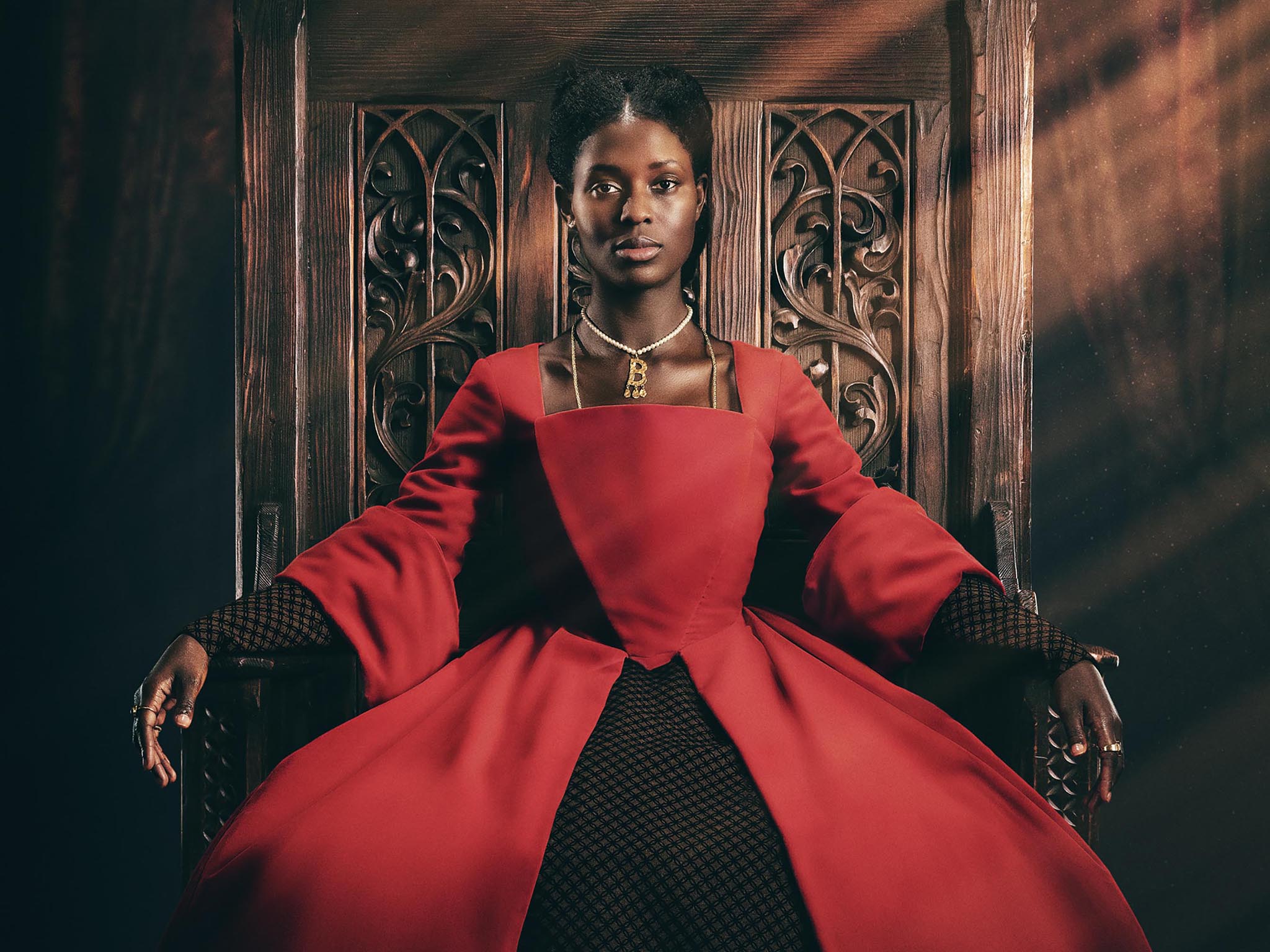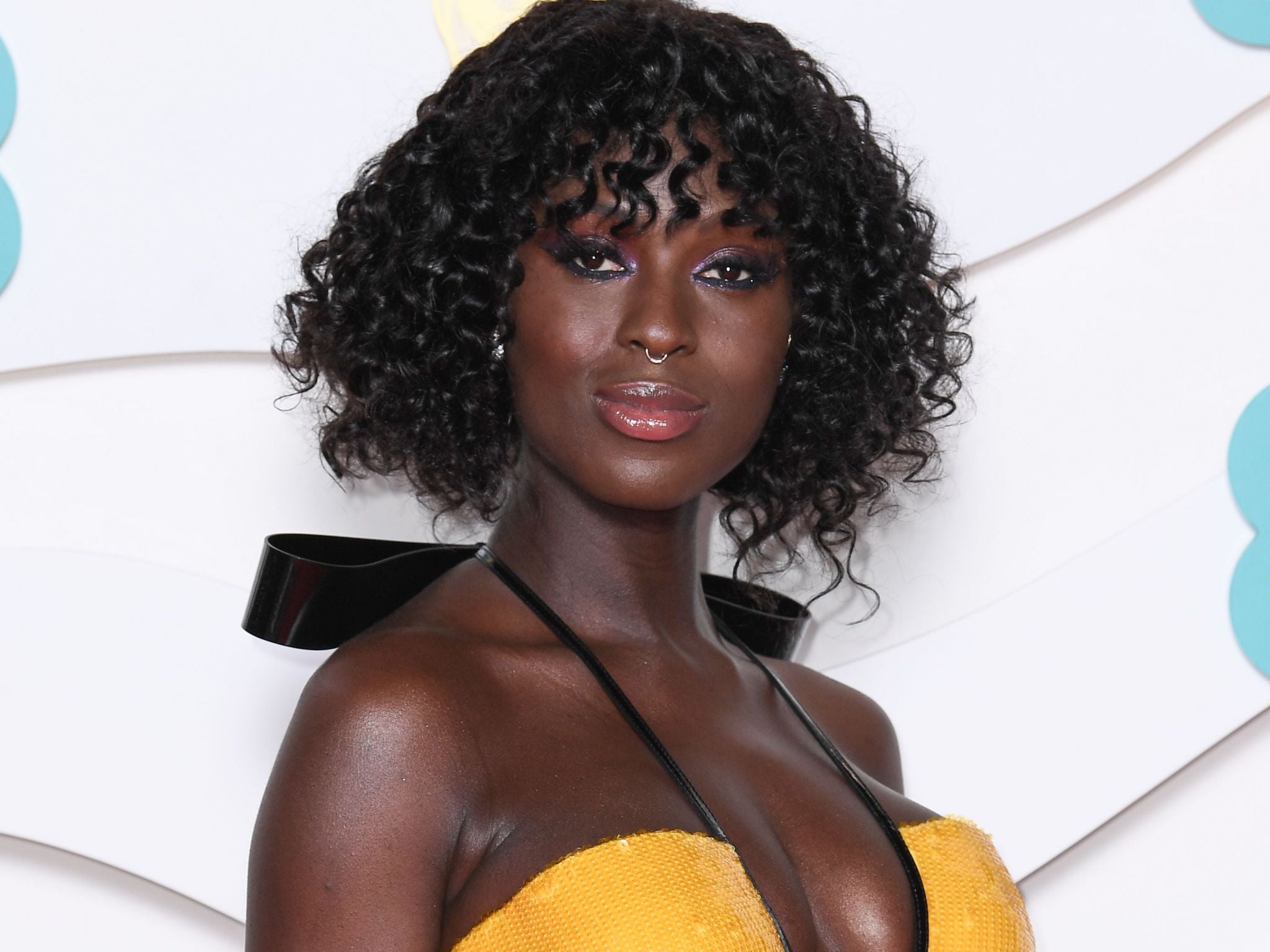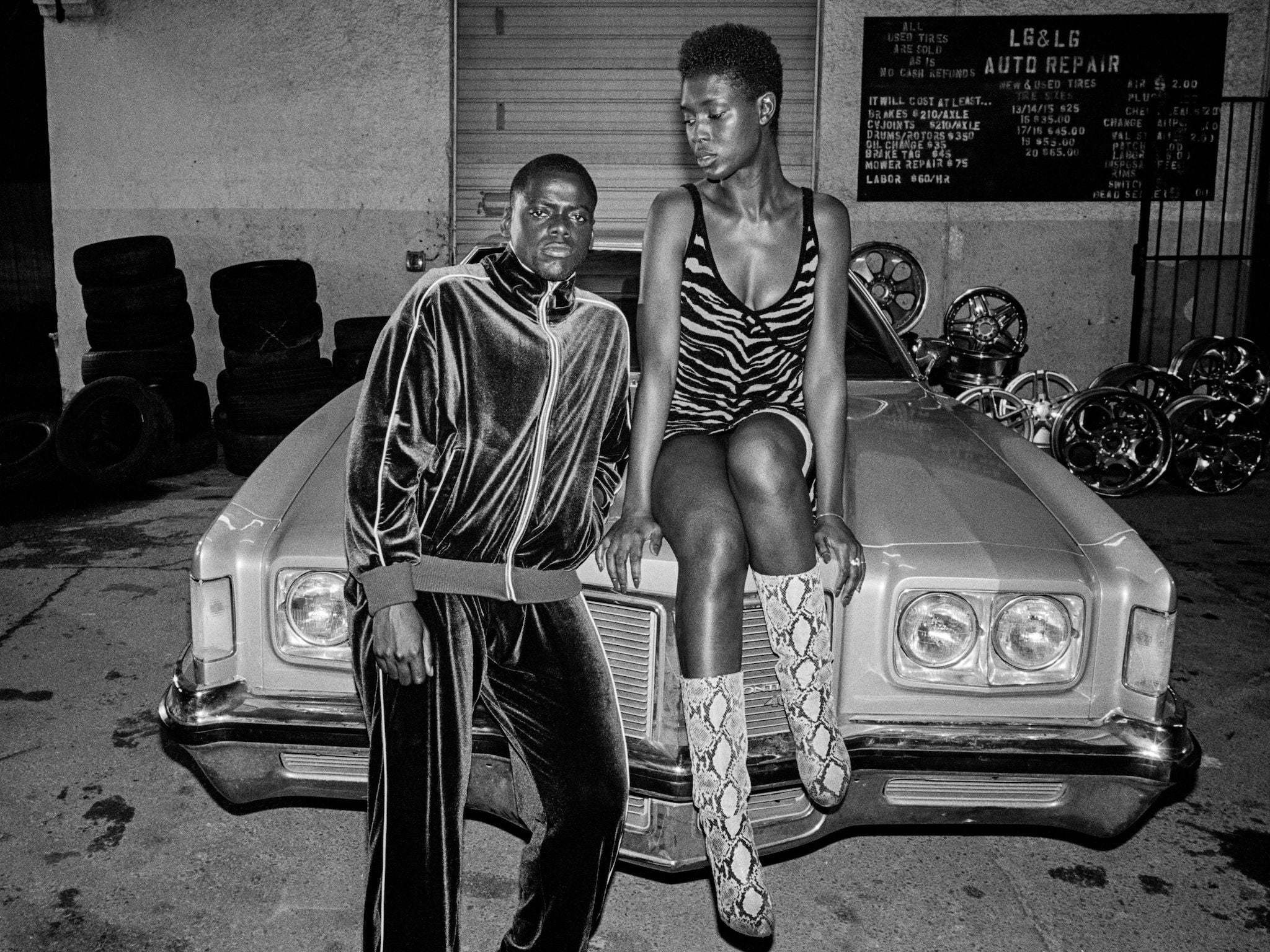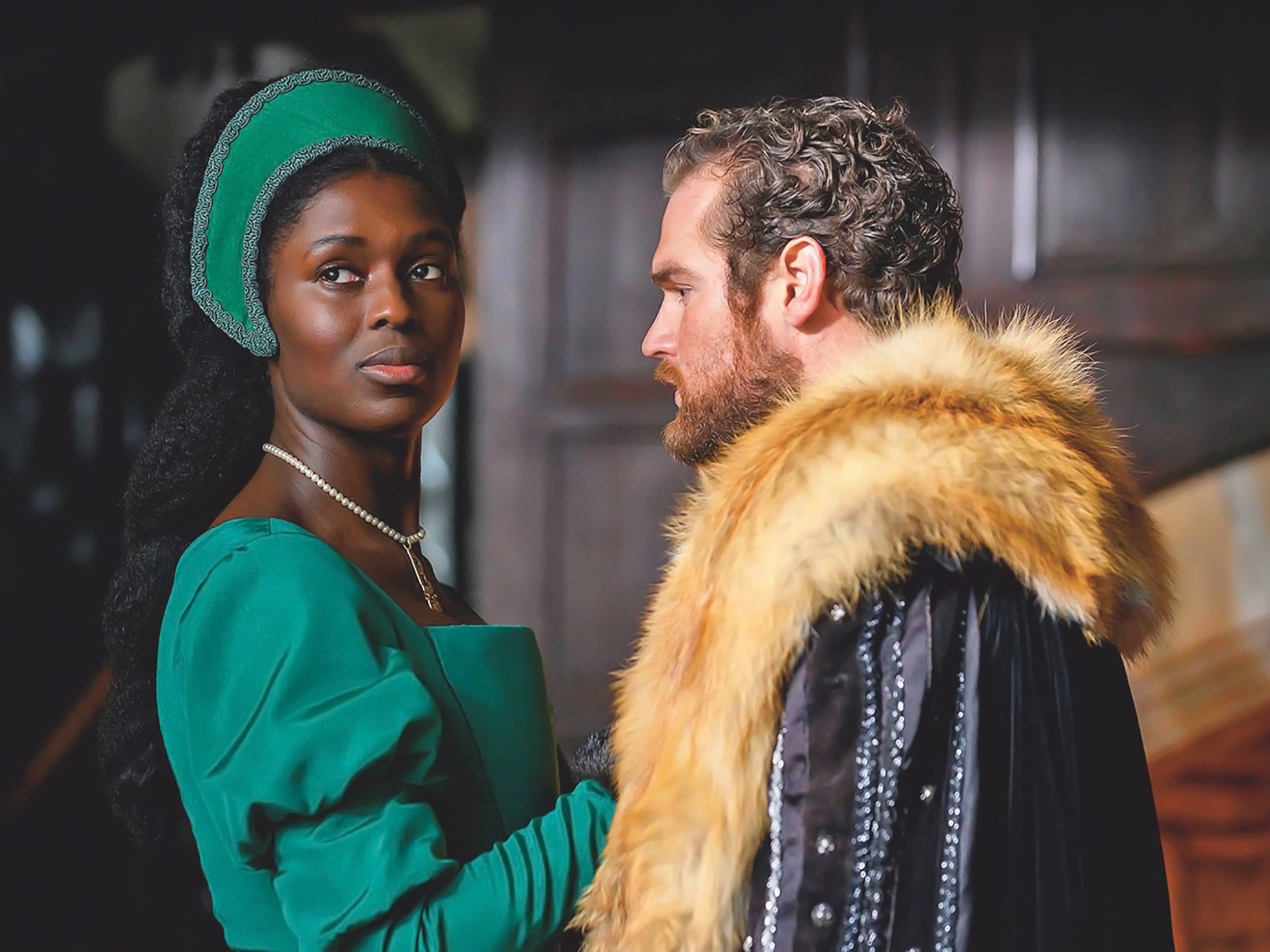Jodie Turner-Smith: ‘People were always going to feel a certain way about a Black actor playing Anne Boleyn’
The star of ‘Anne Boleyn’, who broke onto screens in ‘Queen & Slim’, has caused a furore by playing the doomed Tudor. She talks to Annabel Nugent about motherhood, telling stories with humanity, and taking ‘race out of the conversation’


Jodie Turner-Smith knew it would make people angry. A Black woman playing a Tudor queen? Backlash, she says, is “par for the course” when you’re an actor, and this week has proved her right. Her name has trended on social media, accompanied by cries of double standards and claims that the casting choice is proof of the woke brigade gone berserk. “People are making memes of Ryan Gosling playing Barack Obama,” she laughs, and rolls her eyes at the implication that the two scenarios are the same.
We’re speaking about her lead role in Anne Boleyn, the historical drama that concluded its three-part run on Channel 5 this week. Today, Turner-Smith is sitting in a New York hotel room, with a composure not unlike that of her most recent character. Maybe it’s the stately looking floral wallpaper behind her, or her British accent, largely untempered by decades living abroad. Or maybe it’s that infallible posture. Even without Boleyn’s French hood and suffocating corset, the actor retains a sense of regality in her pepto-pink Gucci minidress.
The “plucked from obscurity” line is as cliché as it is hard to resist when describing Turner-Smith’s origin story. She seemed to have materialised as a fully formed actor aged 33 in 2019’s huge smash Queen & Slim. Written by Emmy winner Lena Waithe, the romantic thriller starred Turner-Smith and Daniel Kaluuya as a Black Ohio couple on the run after they kill a police officer in self-defence during a traffic stop on their first date. Reviews for the film were largely positive, but praise for the scene-stealing Turner-Smith was universal.
Since then, she has starred in two more films: an action thriller with Michael B Jordan titled Without Remorse, which she shot in Berlin during her second trimester of pregnancy, and the not-yet-released After Yang, an A24 sci-fi drama with Colin Farrell. Next up, the actor was supposed to lead in The Witcher: Blood Origin, a spin-off series of Netflix’s hit fantasy show starring Henry Cavill – only she had to bow out due to scheduling conflicts.
But it’s her role as Anne Boleyn that has caused the most fuss. The “psychological thriller” follows the queen in the final weeks before her execution, chronicling her miscarriage and her fall from the king’s favour. Series creator Eve Hedderwick Turner breaks new ground in the familiar tale by focusing on Boleyn’s unravelling state of mind. The camera clings to Turner-Smith’s face, which, like a lid trying to stay on top of a bubbling pot, develops a subdermal twitch as she suppresses the swirling turmoil beneath a stoic surface.
Turner-Smith was selected in line with the producers’ “identity-conscious casting”, where actors are selected based on their “energy”, regardless of ethnicity. She is understanding of the upset her portrayal has caused, though – more understanding than some of her critics deserve. “At the end of the day, people were always going to feel a certain way about a Black actor playing Anne,” she says. Turner-Smith reminds me that historical fiction has always deviated from fact – after all, Henry VIII looked nothing like Jonathan Rhys Meyers, who played the king in Showtime’s bodice-ripping series The Tudors. “Still, I knew it would be challenging for people because race is challenging for people,” she continues. “Some people of colour too are asking, ‘Why are they doing this?’” Her lips curl up slightly into a dry smile. “But you know, not everything is for everybody.”
We return to the memes of Ryan Gosling as Obama and Brad Pitt as Malcolm X. “I think the nuance that people are missing is that historically, people of colour have been erased from stories and thus their humanity has been erased,” she explains. “In this, we’re not erasing white people’s humanity. We’re taking race out of the conversation to tell the human story at the centre of it all.” Speaking personally, she continues, “As a Black artist in general, my main desire is for my humanity to be considered. Not just that I’m a Black woman but that I’m a human having a human experience and existing in a human space.”
Anne Boleyn has many motifs: grief, power, feminism. Turner-Smith views it from the perspective of a new mother. She began filming the series just five months after giving birth in April last year, at home in LA with her partner and middle-school crush, Dawson’s Creek star Joshua Jackson. “There were all these brand new feelings that I was having towards this little person that came from my body,” she says, and with them came questions: “How am I different now? How have I changed? How have I expanded? Has anything closed? What has opened inside of me?”

There was one scene in particular that Turner-Smith knew she needed to get right: the miscarriage. Although the fact of Anne Boleyn’s pregnancy loss is well known, the show’s unwavering depiction of it will still catch viewers off guard – a reaction prompted in part by the lack of realistic portrayals of miscarriage on screen. It’s a searing moment that demands the audience bear witness to her tragedy even as the characters around her swiftly move on. Having gone through the loss of a pregnancy herself, Turner-Smith took into the scene “my own experience of birthing but also this idea of helplessness, of not being able to stop something terrible from happening, and feeling in your own body that it was happening but having to carry on”.
On the set of Anne Boleyn, Turner-Smith was surprised to find support within an environment notorious for its contempt of working mothers. She credits it to the fact that most of the crew, and several of the producers, were women, and some were mothers too. “There was a level of compassion,” she says. “They gave me the space to nurse, to feed my child when I needed to. It’s insane to think that women have to pump in supply closets or run home from work.” When I say I’m glad to hear of her good experience among the industry horror stories, the actor echoes: “Horror stories! Honestly, after you have a baby, and actually when you’re pregnant too…” – she lets out a dramatic exhale in sync with an equally theatrical side-eye – “you’re treated like an inconvenience, you know. It’s mad how much discrimination there is against mothers in the workplace.”
Few actors have come out of the blue quite like Turner-Smith. At age 10, the actor – who was born to Jamaican parents in Peterborough – moved from the UK to Maryland with her mother. By 22, she had quit her job at Pittsburgh’s PNC bank and was mulling a move to Hollywood. It was the musician Pharrell Williams who convinced her to take the plunge. A friend working backstage at a NERD show had introduced Turner-Smith to the 13-time Grammy winner, who in turn put her in touch with music video director Hype Williams. She got off the plane at LAX and went straight onto the set for “Walkin’ on the Moon” by The-Dream and Kanye West.

More music video appearances followed (for acts including MGMT, Noah Cyrus and Zayn Malik) and it wasn’t long until Turner-Smith’s burgeoning career as a good-looking extra put her in the running for a lead part instead. She landed a recurring role as a siren in HBO vampire drama True Blood before moving on to meatier parts in Nightflyers (George RR Martin’s other show) and the post-apocalyptic series The Last Ship.
Then came her career-making turn in Queen & Slim. Although Turner-Smith didn’t relocate to the US in order to pursue acting (the move was prompted by her parents’ divorce), I wonder whether she believes the migration benefited her career in the end. Fellow Brit-born actors such as Delroy Lindo and her co-star Kaluuya have suggested that staying in the UK would have hindered their own success due to racism in the industry and the lack of decent parts for Black actors. Does she feel the same way? “What I will say,” she begins, “is that at the end of the day I support and believe what my fellow actors are saying. But at the same time, race and racism are problems in the industry worldwide.”
Turner-Smith counts herself lucky that she is “coming up” in Hollywood in the current climate. “Things would’ve been different for me 15 years ago, 10 years ago,” she says, absent-mindedly passing a finger over her cornflower-blue nails. “I mean, Anne Boleyn was my first UK show and I not only got to be the lead, but I got to play Anne Boleyn,” she chuckles. Surely, that in itself is a step in the right direction towards a more inclusive industry – as is, perhaps, the period drama Bridgerton, or the 2019 adaptation of David Copperfield starring Dev Patel.

The Academy Awards have also had their most diverse year ever: two women were nominated for best director, and the best actor category featured not only the first Muslim nominee but also the first Asian-American candidate. Turner-Smith’s Queen & Slim co-star Kaluuya picked up his first award for Judas and the Black Messiah. I’ve only just mentioned Kaluuya’s win when Turner-Smith begins tearing up. “There is not a person more deserving, who works harder. I am so happy for him,” she says, pausing to dab at a teary eye. Clasping her hands in front of her, she adds, “I just think that it’s about time.” The day before the ceremony she texted Kaluuya a message to say that, in her mind, he was already a winner. She gushes, “I’ll get emotional over Daniel any day. I love him so much.”
But is this shift towards a more diverse film industry genuine? Or merely in service of optics and hashtags? Turner-Smith seems already to have given the question a lot of thought. “At the end of the day, this is a business supported by what? Dollars. So, when money is the most important thing to people, changes aren’t always going to be made because of their morals,” she says matter-of-factly. “That said, we’re having this conversation, we’re pushing it forward. And whether we get in the door because somebody is just wanting to make a point in this moment is largely...”
She pauses for a few seconds and resets. “We walk so that those behind us can run.”
Join our commenting forum
Join thought-provoking conversations, follow other Independent readers and see their replies
Comments


Bookmark popover
Removed from bookmarks